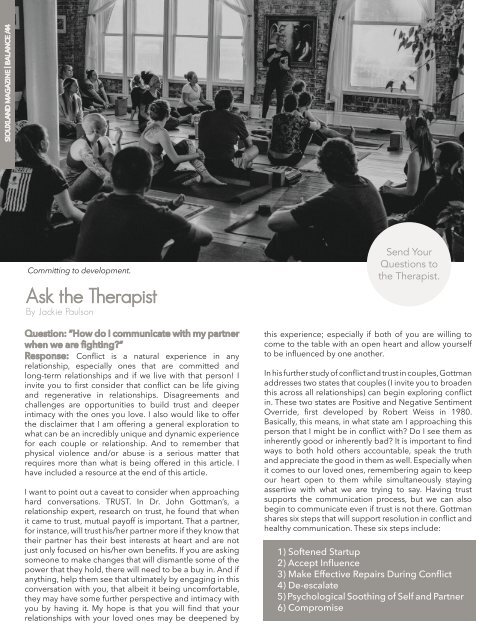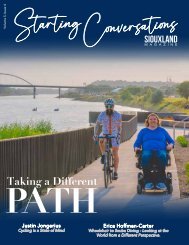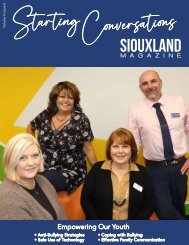Siouxland Magazine - Volume 2 Issue 5
You also want an ePaper? Increase the reach of your titles
YUMPU automatically turns print PDFs into web optimized ePapers that Google loves.
<strong>Siouxland</strong> <strong>Magazine</strong> | Balance /44<br />
Committing to development.<br />
Ask the Therapist<br />
By Jackie Paulson<br />
Question: “How do I communicate with my partner<br />
when we are fighting?”<br />
Response: Conflict is a natural experience in any<br />
relationship, especially ones that are committed and<br />
long-term relationships and if we live with that person! I<br />
invite you to first consider that conflict can be life giving<br />
and regenerative in relationships. Disagreements and<br />
challenges are opportunities to build trust and deeper<br />
intimacy with the ones you love. I also would like to offer<br />
the disclaimer that I am offering a general exploration to<br />
what can be an incredibly unique and dynamic experience<br />
for each couple or relationship. And to remember that<br />
physical violence and/or abuse is a serious matter that<br />
requires more than what is being offered in this article. I<br />
have included a resource at the end of this article.<br />
I want to point out a caveat to consider when approaching<br />
hard conversations. TRUST. In Dr. John Gottman’s, a<br />
relationship expert, research on trust, he found that when<br />
it came to trust, mutual payoff is important. That a partner,<br />
for instance, will trust his/her partner more if they know that<br />
their partner has their best interests at heart and are not<br />
just only focused on his/her own benefits. If you are asking<br />
someone to make changes that will dismantle some of the<br />
power that they hold, there will need to be a buy in. And if<br />
anything, help them see that ultimately by engaging in this<br />
conversation with you, that albeit it being uncomfortable,<br />
they may have some further perspective and intimacy with<br />
you by having it. My hope is that you will find that your<br />
relationships with your loved ones may be deepened by<br />
Send Your<br />
Questions to<br />
the Therapist.<br />
this experience; especially if both of you are willing to<br />
come to the table with an open heart and allow yourself<br />
to be influenced by one another.<br />
In his further study of conflict and trust in couples, Gottman<br />
addresses two states that couples (I invite you to broaden<br />
this across all relationships) can begin exploring conflict<br />
in. These two states are Positive and Negative Sentiment<br />
Override, first developed by Robert Weiss in 1980.<br />
Basically, this means, in what state am I approaching this<br />
person that I might be in conflict with? Do I see them as<br />
inherently good or inherently bad? It is important to find<br />
ways to both hold others accountable, speak the truth<br />
and appreciate the good in them as well. Especially when<br />
it comes to our loved ones, remembering again to keep<br />
our heart open to them while simultaneously staying<br />
assertive with what we are trying to say. Having trust<br />
supports the communication process, but we can also<br />
begin to communicate even if trust is not there. Gottman<br />
shares six steps that will support resolution in conflict and<br />
healthy communication. These six steps include:<br />
Softened Startup<br />
1) Accept Softened Influence Startup<br />
2) Make Accept Effective Influence Repairs During Conflict<br />
3) De-escalate Make Effective Repairs During Conflict<br />
Psychological Soothing of Self and Partner<br />
4) De-escalate<br />
Compromise<br />
5) Psychological Soothing of Self and Partner<br />
6) Compromise


















